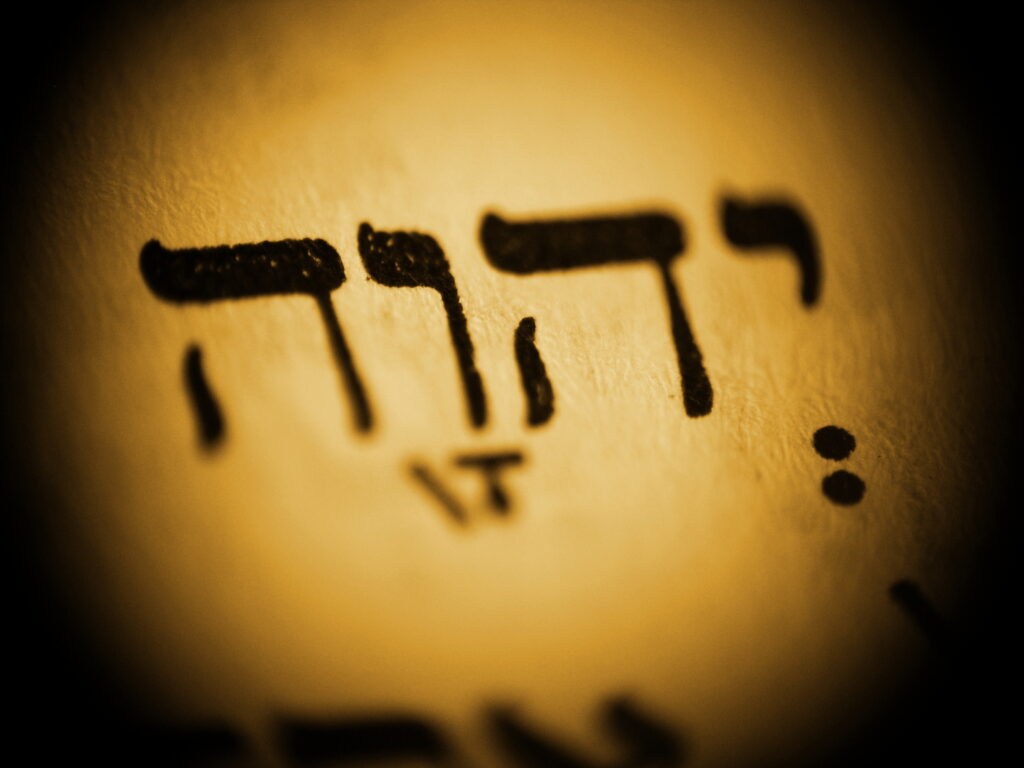Glossary of Hebrew Words for Every Christian
There are some essential Hebrew words every Christian should know, if going deeper in knowing and understanding the Bible is your goal. The Old Testament was written entirely in Hebrew, thus exploring the Hebrew language could enhance our understanding of Scripture. And although the New Testament was written in Greek, the context remains very Hebraic.
Over the past several years, we have been introducing you to some of the most fascinating Hebrew words in the Bible. Here, you will find brief descriptions of what they are, and some links to the articles that will help you dig deeper.
As a Christian, you should not hesitate to study Hebrew words – after all, even Jesus used them!
Download your FREE 7 Hebrew Words Every Christian Should Know PDF:
7 Hebrew Words Every Christian Should Know: Names of God
- יהוה – Yahweh or Yehovah
- ישוע – Yeshua – Salvation
- רוח – Ruach – Spirit, Wind and Breath
- משיח – Messiah – Christ, the Anointed One
- עמנואל – Immanuel – God with Us
- אלוהים – Elohim – another name of God
- אדוני – Adonai – Lord

YAHWEH or YEHOVAH (JEHOVAH)
The tetragrammaton, YHVH, is the personal name of God in the Hebrew Bible.
In English translations, it is often translated as “the LORD” – in capital letters. When the Jewish people read their Hebrew Scriptures, they usually say “Adonai” when the name יַהְוֶה appears. They consider themselves unworthy to utter God’s name.
YESHUA – SALVATION
Jesus’ disciples wouldn’t have called Him anything other than Yeshua. In Luke 1, the archangel Gabriel tells Mary (or Miriam) to name her son Yeshua – meaning “salvation.” An angel also tells Joseph, “You shall call His name Jesus, for He will save His people from their sins.” (Matt 1:21-22)
RUACH – SPIRIT, WIND, BREATH
The Hebrew word Ruach is translated in the Bible as “spirit,” “wind,” or “breath.” In the Bible, the word describes the Holy Spirit or the Spirit of God. The first mention of Ruach is in the very first chapter of Genesis: “And the earth was a formless and desolate emptiness… and the Spirit (Ruach) of God was hovering over the surface of the waters.” (Gen 1:2)
MESSIAH – CHRIST, THE ANOINTED ONE
Many Christians refer to Yeshua by His Greek name – Jesus Christ. But have you ever wondered what Christ means? It is nothing else but the Greek equivalent of the word Messiah! This Hebrew word refers to the promised deliverer or savior, and literally means “the Anointed One.”
IMMANUEL – GOD WITH US
This prophetic name of Jesus appears both in the Old and in the New Testament. First, in the book of Isaiah, the prophet foretells that a virgin will birth a son, who will be called Immanuel.
In Matthew 1:23, an Angel quotes the prophet Isaiah to Joseph, using this Hebrew name (important to mention, since the Gospel was written in Greek). He translates it to mean “God with us.”
ELOHIM, ADONAI – More Names of GOD
Many of us may be familiar with various names of God. But do we know how they are different and what they mean? Elohim appears in the Bible quite often, but in two different ways – as a common noun (to signify divinity, a ghost) and a proper noun – name for the one and only God.
Then, there’s Adonai, which also takes on different functions. Like mentioned before, the Jewish people say “Adonai” where YHVH appears in Scriptures. But Adonai also translates to, simply, “my Lord.” As such, it often describes just a person with authority or an angelic being.
7 Hebrew Words Every Christian Should Know: Foundations
- קדוש – Kadosh – Holy
- ברוך – Baruch – Blessed
- חסד – Hesed – Love, Lovingkindness
- אהבה – Ahava – Another Word for Love
- רחם – Racham – Another Word for Love
- דוד – Dod – Beloved
- כבוד – Kavod – Glory

KADOSH – HOLY
The dictionary defines holy as a “religious or morally good… perfect in goodness and righteousness”. There are times when aspects of moral righteousness are connected to the meaning of “holy”. Nevertheless, the Biblical term holiness does not in fact refer to piety.
The Hebrew word for “holy” is kadosh. And when the Bible calls something holy, it rather points to it being “set apart” from everything else.
BARUCH – BLESSED
To bless and be blessed is a fundamental part of our relationship with God, as well as relationships with other people. Blessings, whether given or received, help us recognize God in our lives and draw closer to Him – because we are not self-sufficient. We do not control or dictate the power of blessing – it is all God’s.
HESED – LOVE
One of the Hebrew words for ‘love’ is hesed, but in fact, it has a range of meanings. Described as an undeserved kindness and generosity, it is one of the most fundamental characteristics of God, covenantal in nature. Throughout the Hebrew Bible, it is translated in a number of different ways: steadfast love, mercy, kindness, and goodness.
AHAVA, RACHAM, DOD – More Words for LOVE
The word love is powerful but also broad – so it’s not surprising that in Hebrew, there are multiple words for it. In the Bible, ahava often points to an intense emotional bond. Then, David used the word racham to express His devoutness to God. And also, a unique word dod appears frequently in a romantic context, usually translated into “beloved”.
KAVOD – GLORY
Kavod is a term with both social and moral implications, and stems from the root word for weight. It can mean glory, honor, respect, distinction, and importance. Most often translated into glory, it indicates worth and value, and results in praise. Glory in Hebrew should be seen as abounding in reverence, almost to a degree that it is terrifying.
6 Hebrew Words Every Christian Should Know: Receiving Blessing
- שלום – Shalom – Peace
- תקווה – Tikvah – Hope
- אמונה – Emunah – Faith
- חן – Hen – Grace
- חיים – Chava, Chaim, Chaya – Life
- חוכמה – Chokhma – Wisdom
SHALOM – PEACE
Many are familiar with the Hebrew word shalom. Generally speaking, it means “peace” in English. The common western definition of peace is the absence of conflict or war. But in Hebrew it means so much more! It conveys a broader sense of wholeness, well-being, and harmony.
TIKVAH – HOPE
In the Hebrew context, hope – tikvah – is more than just a dream. It is an expectation, and a strong expression of faith. The Bible teaches that hope is like a rock you can rely on. You can hold fast to it, and it strengthens you. God promised Israel that His plans are not meant for evil, but to give them “a future and a hope.” (Jer 29:11)
EMUNAH – FAITH
The Hebrew word Emunah may not sound familiar at first, but how about the word AMEN? Emunah is the Hebrew word for faith, and Amen derives from it! Emunah is faith that results in faithfulness, implying action. It set apart the biblical saints described in Hebrews 11, the Biblical “hall of heroes”: Noah, Abraham, Sarah, Moses, Rahab, and more.
HEN – GRACE
The most common Hebrew word for “grace” is hen. However, sometimes it is translated into ‘precious’ or ‘valuable’. At the same time, if we look for ‘grace’ in an English Bible, we will quickly discover that the Hebrew original does not always use hen in defining grace. So, how do we make sense out of that?
CHAVAH / CHAIM / CHAYA – LIFE
The first woman on earth was named Chavah – this is the Hebrew equivalent of the English name Eve or Eva. In the very beginning, the first woman received the name that meant “to live, to give life, or to breathe”. God commanded Adam and Eve to be fruitful and increase in number. God first created them and then invited them – His creation – to also create life.
CHOKHMA – WISDOM
The Hebrew word for wisdom is chokhma, and the Bible tells us to acquire it at every cost. The Hebrew and Biblical understanding of wisdom shows how powerful it can be in our lives. In fact, the Word of God states that wisdom of God protects us and guards us from evil and sin.
6 Hebrew Words Every Christian Should Know: Life of a Believer
- תפילה – Tefilah – Prayer
- יראה – Yirah – Fear, Awe
- תשובה – Teshuva – Repentance
- הללויה – Hallelujah – Praise God
- הנני – Hineni – Here Am I!
- הושענא – Hosanna – Save Us

TEFILLAH – PRAYER
Although tefillah – prayer – expresses the deepest wishes and desires of our heart, it is much more than a wish. Prayer is supplication and petition, but it also means something more. Tefillah comes from the Hebrew word l’hitpalel, which stands for the process of accounting or contemplation, as well as “to judge oneself”.
YIRAH – FEAR, AWE
The Hebrew word translated into ‘awe’ in the Bible is yirah. It often directly translates into fear, like “fear of the Lord,” and it can also mean respect, reverence, and worship. Moses was filled with yirah when he begged God to see His glory and could not behold it lest he should die.
TESHUVA – REPENTANCE
The instruction ‘to repent’ has a very heavy connotation for most people. Defined as ‘regret’ or ‘being remorseful’, it sounds uncomfortable. But the Hebrew word we translate as ‘repentance’ is teshuva and it is a lot more than a feeling of guilt or regret. In fact, it derives from the verb ‘to return’!
HALLELUJAH – PRAISE GOD
Hallelujah is a Hebrew expression meaning “praise the LORD,” commonly used in worship and celebration. But there is more than one Hebrew word in the Bible used to describe an act of praise. For example, Zamar is the kind of praise implies the use of string instruments, and David was able to move the spiritual realm with just a few plucks of strings. Hallel (הלל)on its own means “praise.”
HINENI – HERE AM I!
The phrase “Here am I!” has a heroic ring to it. This phrase became famous thanks to a passage from the Book of Isaiah. It was the prophet’s courageous response to God’s calling: And I heard the voice of the Lord, saying, ‘Whom shall I send, and who will go for us?’ Then I said, ‘Hineni (here am I)! Send me.’ (Is 6:8)
HOSANNA – SAVE US
The people yelled out Hosanna, or more accurately “Hoshi’ana”, when they welcomed Jesus in Jerusalem on what we now call Palm Sunday. Was that praise? Not exactly – they were in fact crying out for help! The Hebrew expression Hoshi’ana means “Save us”. The Hebrews who raised their voices that day recognized their helpless state.
6 Hebrew Words Every Christian Should Know: The Hebrew People
- תורה – Torah – Law
- שמע – Shema – Hear, Listen (a Jewish Prayer)
- שמות – Sh’mot – Names / Book of Exodus
- צדקה – Tzedakah – Righteousness (also: Generosity)
- נפש – Nephesh – Soul
- עלייה – Aliyah – Ascend / Immigration to Israel
TORAH – LAW
Most often, we understand the Torah to be “the law”, and most Christians tend to react to that law, or the Torah, with reservation. But in Psalm 119:18, David writes “Open my eyes, that I may behold wonderful things from Your law.” How can “wonderful” and “law” go together. What did David understand that we don’t?
SHEMA – HEAR, LISTEN
The most important prayer and declaration in the Jewish life is the Shema Prayer. Found in Deuteronomy 6:4-9, it affirms the oneness of God and commands our love and devotion to Him. In Hebrew, the word “shema” means hearing but also the effect of it. Which is taking heed, being obedient, and moreover doing what is asked.
SH’MOT – NAMES / BOOK OF EXODUS
Do you know the names of the first five books of the Bible – the Books of Moses or the Torah? Genesis, Exodus, Leviticus, Numbers, and Deuteronomy is a mix between English and Greek. But weren’t they written in Hebrew? In the original, Genesis is called Bereshit (“In the beginning…”) and Exodus is the book of Sh’mot, which means “names.”
TZEDAKAH – RIGHTEOUSNESS / GENEROSITY
The concept known as tzedakah finds its origins in the Torah. This Hebrew word literally means righteousness, but Hebrew speakers use it in reference to giving and charity. God is specifically commanding the Israelites to consider the poor among them. It is all about the posture and condition of our heart.
NEPHESH – SOUL
The Hebrew word nephesh generally translates to “soul”. But in the Bible, nephesh is also translated into living being, life, creature, mind, heart, appetite, person. We get the sense that nephesh is the inner, living being of a man. What is more, nefesh reveals the immeasurable value and significance God places on human life.
ALIYAH – ASCEND / IMMIGRATION
The term the Israeli government uses to describe Jewish immigration to Israel is to ‘make aliyah’.
In Hebrew, “aliyah” means “to go up” or “climb up.” When God is calling His people to make aliyah, He calls them to ascend and meet with Him. The return to the land is the most repeated promise in the Old Testament. Today, we are watching these ancient biblical prophecies being fulfilled before our eyes.
6 More Hebrew Words Every Christian Should Know
- מלאך – Malach – Angel, Messenger
- משפחה – Mishpacha – Family
- בראשית – Bereshit – In the beginning / Book of Genesis
- שנא – Sane – Hate
- לחם – Lechem – Bread
- ערב – Erev – Evening, Night Before

MALACH – ANGEL, MESSENGER
What do we typically think of when we think of angels? I hope it’s not the chubby babies commonly depicted in Renaissance art. The Bible has detailed descriptions of who the angels are (and are not). They are spiritual beings, with supernatural abilities and gifts. But angels are not divine beings that we should worship.
MISHPACHA – FAMILY
The Hebrew word for family, both in the Bible and in modern Hebrew, is mishpacha. God created marriage and family so that, as a family, we would bring glory to Him. How? The first mishpacha in the Bible is a great reminder of that. They had a relationship with each other but were still dependent on God. And growing their family meant obeying God!
BERESHIT – BEGINNING
The word bereshit, which opens the Scripture, points to the start of something. “In the beginning…” – God gave us this word so we would understand that He is at the beginning of all things, and He already was prior to the start of anything. Thus, these first words of the Bible are an indictment against our human self-sufficiency.
SANE – HATE
How can we reconcile a God who says He is love when He also says He hated someone?
In Malachi, God mentions Jacob and Esau, two brothers, sons of Isaac. God’s feelings for these two brothers seem vastly different: “Jacob I have loved; but Esau I have hated.” (Mal 1:3) The thing is, the ancient Hebrew view of hate – sa’ne – was not about hostility, but about a hurt or wound that resulted because love was involved.
LECHEM – BREAD
The Hebrew word for bread is “lechem.” Moses wrote, “Man does not live by bread alone, but by every word that comes from the mouth of the LORD.” The first bread is simple enough to understand, but how do we interpret this second lechem? Jesus said He is “the bread of life” – He sustains our lives! He is the Word of God that we need to live.
EREV – EVENING, NIGHT BEFORE
English most often translates the Hebrew word “erev” as “evening.” But that only captures a small aspect of its rich meaning and significance in Hebrew. In the Bible, “erev” is often used to describe significant moments of transition. Time cycles begin at “erev” in Hebrew understanding. The eve creates space for anticipation and preparation for what is to come.
What Other Hebrew Words Should a Christian Know?
Understanding these Hebrew words can deepen one’s appreciation of the biblical text and its cultural and historical context, enriching one’s spiritual journey and understanding of the Christian faith.

7 Hebrew Words Every Christian Should Know: Free PDF Download
With the use of the Hebrew language God revealed Himself to mankind. This ancient tongue held the greatest spiritual truths that guided our lives through the ages. And in each generation, they are discovered anew.
We know the Bible can be hard to understand and you want to get more out of it. Which is why we want to teach you seven Hebrew words that will transform the way you read the Bible.
Articles by Hebrew Words Every Christian Should Know: A Glossary
Estimated reading time: 14 minutes